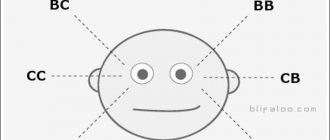Change of point of view
One day, a famous Greek philosopher ordered his student to pay money to anyone who offended him for three years. After this period, the philosopher said to him: “Now you can go to Athens and learn wisdom.” When the student entered Athens, he saw a sage at the gates of the city, who showered curses on everyone who entered and left the city. The student also got it, but he only laughed in response. “Why are you laughing, because I insulted you?” – the sage asked him. “Because,” answered the philosopher’s student, “I have been paying for insults for three years, and you are giving them to me for free.” “Enter the city,” said the sage, “it is yours...”
This parable was popular among the desert fathers - hermits, who in the 4th century AD. e. they retired to the desert near the city of Sceta to devote their lives to prayers. It illustrates the value of suffering and life's difficulties. However, it was not only difficulties that opened the gates of the city of wisdom to the philosopher’s student. The main role in this situation was played by his ability to look at things differently, from a different point of view.
The ability to look at things from different points of view is one of the most effective tools in confronting everyday problems. The Dalai Lama explains:
– The ability to look at things differently is very useful. By developing this ability through everyday experience, you can achieve deep peace of mind. It is necessary to understand that every phenomenon, every event has different aspects. Everything is relative. So, I lost my country. From this point of view, everything is very tragic. The forces of destruction are at work in my country. This is a very negative environment. But if you look at everything from a different point of view, from the point of view of a refugee, certain advantages are visible. As a refugee, I am not obliged to obey formalities, follow protocol, or participate in ceremonies. If everything remained the same, I would have to constantly participate in ceremonies, pretend, be a hypocrite. However, in critical situations there is no time for pretense. Thus, from this point of view, the tragic circumstances of my people have certain advantages for me personally. Being a refugee allows me to meet many people - people from different religions, different social and cultural backgrounds, people I would never have met if I had stayed in Tibet. In this sense, everything that happens is very useful for me.
In difficult situations, our horizons narrow. We focus all our attention on one problem, we get the feeling that only we, and no one else, are experiencing such difficulties. This can lead to self-absorption, causing the problem to become much larger. In a situation like this, I think it can help to broaden your perspective - for example, to think that at this very moment there are many other people in a similar, or perhaps much worse, situation. This practice of changing perspective is very effective in various illnesses and during pain. When you are in pain, it is very difficult to concentrate on meditation, but still try to think that there are other aspects to this situation, try to look at it differently. If you think only about one event, it will seem more and more significant to you. If you focus too much on a problem, it will soon seem insurmountable. 'But if you try to compare it with another, more serious problem, to look at it from the outside, it will seem much less significant.
Shortly before my next meeting with the Dalai Lama, I accidentally ran into the administrator of the institution where I once worked. I had several run-ins with him because I thought he cared more about money than patients. We didn’t see each other for a while, but as soon as I saw him again, these quarrels surfaced in my memory, and I felt anger and hatred growing inside me again. By the time I entered the Dalai Lama's room, these feelings had subsided a little, but I was still a little nervous.
“Imagine that someone made you very angry,” I began. – Your natural and immediate reaction to insult is anger. But in some cases, anger arises in you not only at the moment when you were offended. You can remember this event for a long time and each time it’s as if you are experiencing it again. What do you recommend in this situation?
The Dalai Lama nodded his head thoughtfully and looked at me. It seemed to me that he understood that I brought up this topic not only out of academic interest.
“If you look at things from a different angle,” he said, “the person who offended you certainly has some positive qualities.” After carefully analyzing the situation, you will realize that the action that made you angry also opened up some opportunities for you that were previously closed to you. Thus, with some effort, you can find many points of view on the same event. This will help you.
– But what if you cannot find a single positive quality in this person?
“In that case, you should make some efforts.” Try to look at the situation from a different point of view, not superficially, but carefully and thoughtfully. You must make every effort to make your vision of the situation as objective as possible. For example, you might consider that when you are angry at someone, you treat that person as if they were one hundred percent bad. Similarly, when you feel affection for someone, you think that person is absolutely positive. This is not consistent with reality. If your friend, whom you thought was a wonderful person, deliberately hurts you, you suddenly realize that there are also negative qualities in him. In the same way, when your enemy, whom you hate, sincerely asks for your forgiveness and shows his positive qualities, you cease to consider him completely negative. Thus, when you are angry with someone and think that this person has no positive qualities at all, you are mistaken. If you look, you can find something good even in the most evil person. Therefore, when you see a person as an absolute scoundrel, this is a mental projection, not reality.
Likewise, a situation that you consider to be one hundred percent negative may have some positive aspects. But I believe that just discovering these positive aspects is not enough. You should also strengthen this idea in your mind. To change your perception of a situation, you will have to remind yourself of this positive many times. Generally speaking, in a difficult situation, it is impossible to change your attitude by thinking positively once or twice. It takes a long process of learning, practicing and getting used to new attitudes that will allow you to cope with difficulties
.
The Dalai Lama paused for a moment and, maintaining his usual pragmatic position, added:
– If, despite all your attempts, you cannot find a single positive aspect in the situation or action of another person, the best way out is to forget about everything.
Encouraged by the words of the Dalai Lama, that evening I tried to find some “positive aspects” in the administrator’s personality, telling myself that he too could not be one hundred percent negative. This task turned out to be easy. I knew that he loved his children very much. I also had to admit that my confrontations with him had done me some good - I came to the conclusion that I should not continue working in this institution, left there and found a better job. And although these thoughts did not immediately make me change my attitude towards this person to the opposite, they significantly weakened my hatred of him.
Shortly thereafter, the Dalai Lama explained to me an even more effective technique: how to completely transform your attitude towards your enemies and learn to love them.
Aggravation of the conflict in Nagorno-Karabakh: three views from Georgia
What could an escalation of the conflict lead to and what are the prospects for its resolution - Sputnik Georgia asked for the opinion of Georgian experts and political scientists.
- On September 27, the authorities of Armenia and Azerbaijan introduced martial law after the situation on the contact line in Nagorno-Karabakh worsened. Yerevan and Baku place the blame on each other for the escalation of the conflict.
Nothing is by chance
Expert on Caucasus issues Mamuka Areshidze finds it difficult to predict how the military conflict between Armenia and Azerbaijan will end, but the political scientist is confident that it poses a serious threat to the entire region.
“This is a confrontation that has just begun. It is different from others. This did not happen after 1994. The preparation, the scale - all this suggests that the parties are seriously going to fight. Naturally, this is fraught with very serious consequences for the entire region, including Georgia too,” Areshidze said in an interview with Sputnik Georgia.
At the same time, Areshidze does not exclude that the continuation of hostilities could lead to a humanitarian and economic catastrophe.
“In addition to refugees, other things can happen that are no less unpleasant,” the political scientist noted.
© REUTERS / ARMENIAN FOREIGN MINISTRY
The Kremlin called on Armenia and Azerbaijan for maximum restraint
It is difficult to say why the conflict has resumed now. However, the expert is confident that the timing was not chosen by chance.
“I have a certain thought about this. I remember 2008, when the US presidential elections were in full swing, and at that time what began. Now it’s the same thing, the same situation. There are presidential elections in America in November and they seem to be preoccupied with this issue. The USA's hands are tied. They react sluggishly to such events in the rest of the world. And I have this opinion: someone specially chose the time now for this conflict,” Areshidze said.
At the same time, the political scientist is confident that despite the fact that Georgia has limited resources, it can still play its positive role in resolving the conflict.
“The current Georgian authorities differ from previous ones in that they have been able to create a certain sense of stability. There were no warriors in Georgia during their reign. Based on this, they must fully maintain a stable situation not only in their own country, but also try to do this in the region. That is, it can act as a peacemaker and offer the Tbilisi platform, for example, for negotiations. Create a situation so that what is happening in Karabakh is important news for the world community,” the political scientist noted.
A crisis is always an opportunity
According to the forecasts of political scientist Archil Sikharulidze, the military conflict may end in a few days or a few weeks.
© REUTERS / PRESIDENTIAL PRESS OFFICE
Fuel to the fire: Erdogan announced the “occupation of Azerbaijani territories by Armenia”
"Why now? There may be one reason - this is the policy of Turkey, which plays a big game in this direction, Turkey’s interests in the Caucasus. The second is the interests of small states that have their own problems, and they can overcome these problems with war. And the third is, in general, the interests of political and other elites, so that they benefit from the crisis. Any crisis is always an opportunity. The pandemic has become an opportunity for many to increase their influence in the political arena, for some to get rich, for others to sell more weapons, more vaccines. That is, for these people it is always profit,” Sikharulidze said in an interview with Sputnik Georgia.
According to him, behind both Azerbaijan and Armenia there are large states that can help these states fight.
“Eventually the status quo will be restored. It is unlikely that this conflict can be resolved with weapons. Exclusively because powerful Turkey stands behind Azerbaijan, and Russia will not allow Azerbaijan and Turkey to suppress Armenia. Unfortunately, people will again die, but there will be no fundamental changes,” the political scientist believes.
As for Georgia’s position, throughout history it has occupied a clear position of neutrality.
“For us, both Armenia and Azerbaijan are strategic partners. And we want peace and stability. Georgia has not helped anyone with its armed forces or transit and will not do so. Because for us, even from a pragmatic point of view, there is no point in getting involved in this matter,” Sikharulidze emphasized.
© photo: AFP 2020 / KAREN MINASYAN
Armenia and Azerbaijan released footage of the destruction of rivals - video
In both countries, the situation is worse than Georgia in terms of the coronavirus pandemic, however, they find time to fight. This means that this agenda is higher than the coronavirus and all the other problems they have, the political scientist believes.
“The coronavirus is unlikely to affect this. Perhaps this military agenda will help some state or political force to carry out its agenda faster. Usually a crisis is a good opportunity for political forces to shuffle everything so that the population does not realize or find out about it. This is what you can do. And it is quite obvious that the coronavirus is of secondary importance for these states. They are ready not only for military action, but also to fight heated military battles,” Sikharulidze noted.
The situation is explosive
International affairs expert Vaso Kapanadze believes that the aggravation of the situation in Nagorno-Karabakh was expected.
“For a long time, the Azerbaijani or Armenian sides have not been able to agree; they have not come to any compromise for a very long time... Of course, we are all concerned. Moreover, this conflict threatens to develop into a conflict of a regional scale, where players such as Turkey and Russia may be involved... Therefore, of course, the situation is explosive and if the military conflict is not completed in the near future, then there is indeed a danger that the scale of this conflict may increase,” Kapanadze said in a conversation with Sputnik Georgia.
According to the expert, everyone is interested in ending the conflict as soon as possible. This is all the more important for Georgia since its closest neighbors are at war.
© REUTERS/Reuters Staff
The Georgian parliament called on Armenia and Azerbaijan for a ceasefire
“In this case, Georgia adheres to a neutral position, and this is natural. Therefore, the only thing we can offer the warring parties is, of course, mediation. If appropriate conditions are created for this and there is a desire on their part, in Tbilisi or in any other city in the country to contribute to the holding of peace negotiations,” Kapanadze noted.
According to the expert, the pandemic is unlikely to play a positive role in ending this conflict.
“The international community is concerned about this conflict and, in principle, I think there will be no direct intervention. The United States cannot directly support Azerbaijan, although it recognizes the territorial integrity of Azerbaijan. Western countries and the European Union are unlikely to go beyond statements. Here, interest appears on the part of Turkey, first of all, because Erdogan has repeatedly stated that the Turkish people and the Azerbaijani people... On the other hand, Armenia is a member of the CSTO, and if some shell falls on the base in Gyumri, then Russia may also be involved into this conflict. Therefore, the prospects are not very encouraging for us yet,” the political scientist noted.
The essence of the conflict
The authorities of Armenia and Azerbaijan introduced martial law on September 27, after the situation on the contact line in Nagorno-Karabakh worsened. The authorities of the unrecognized republic announced artillery shelling from Azerbaijan and casualties among civilians.
© Sputnik / STRINGER
Ilia II: We pray that God will send peace to Armenia and Azerbaijan
Yerevan and Baku place the blame on each other for the escalation of the conflict. The Armenian Ministry of Defense stated that Karabakh “was subjected to air and missile attacks” from Azerbaijan; Baku claims that the Armenian military opened fire.
The Russian Foreign Ministry called on the parties to the conflict to immediately cease fire and begin negotiations.
The Karabakh conflict began in February 1988, when the Nagorno-Karabakh Autonomous Region announced its secession from the Azerbaijan SSR. As a result of the armed confrontation in 1992-1994, Azerbaijan lost control over Nagorno-Karabakh and seven adjacent regions. Since 1992, negotiations on a peaceful resolution of the conflict have been held within the framework of the OSCE Minsk Group, led by three co-chairs - Russia, the USA and France. Azerbaijan insists on maintaining its territorial integrity, and Armenia defends the interests of the unrecognized republic, since NKR is not a party to the negotiations.
Socratic method
Socrates is one of the greatest ancient Greek philosophers. He had a huge influence on many generations of thinkers.
Socrates used a persuasion technique known today as the Socratic Method. It has several interpretations. One of them is to get affirmative responses at the beginning of the conversation.
Socrates asked questions with which his opponent was forced to agree. He received one statement after another until he had a whole list of “YES” sounds. Eventually, the person would find that he had come to a conclusion that he had previously objected to.
The Chinese have a proverb that embodies the centuries-old wisdom of the East:
“He who treads softly goes far.”
By the way, please note that many politicians use the method of obtaining affirmative responses from the crowd when they need to win the electorate at some rally.
Now you know that this is not just an accident, but a clearly working method that is deftly used by knowledgeable people.
So, if you want to convince people and defend your point of view, learn how to correctly formulate questions to which your opponent will be forced to say “Yes.”
Show compassion
Want to know a phrase that stops arguments, destroys ill will, generates goodwill and makes others listen carefully? Here she is:
“I don’t blame you at all for having such feelings; if I were you, I would undoubtedly feel the same.”
This kind of phrase will soften the most grumpy interlocutor. Moreover, when you say it, you can consider yourself absolutely sincere, because if you really were that person, then, of course, you would feel the way he did.
Thinking with an open mind, each of us can come to the conclusion that in fact, who you are is not your merit. It was not you who decided what family to be born into and what kind of upbringing to receive. Therefore, an irritable, intolerant and frivolous person also does not deserve more condemnation for being what he is.
Have pity on the poor guy. Sympathize with him. Show some sympathy. Tell yourself what John Gough said when he saw a drunkard standing on his feet: “It might have been me, but for the grace of God.”
Three quarters of the people you meet tomorrow crave sympathy. Show it and they will love you.
In his book Parenting Psychology, Dr. Arthur Gate says, “The human being craves sympathy. The child willingly shows his bruise, or deliberately inflicts a wound on himself in order to evoke warm sympathy. For the same purpose, adults talk in great detail about their misfortunes and expect compassion.”
Thus, if you want to persuade people of your point of view, learn to first be empathetic to the thoughts and desires of others.
For registered users
Slurp freely Breathe deeply See clearly Think globally Act locally Take chances Be gentle with the earth Simplify the things Walk more Travel light Take your time Break the cycle Define the future Find your future Be open-minded Generate a fresh perspective Shared experience reaps new rewards. Follow your instincts, You don't need to be look ORDINARY. JUST BE YOURSELF!
These 20 lines live in the souls of people who are considered abnormal, brave, extraordinary, bright, frivolous, original, immoral. These 20 lines are embodied in their catchy and unusual, out-of-the-ordinary image. These 20 lines serve as a kind of hymn for them. Freak culture is a culture of brave and absolutely crazy people. “Freak” translated from slang English means “crazy”, “mad”, but a new meaning adds a certain connotation to this word - “insanely fashionable, reaching the point of subtle kitsch.” Freaks are exalted, extroverted characters; another Americanism that is firmly entrenched in our dictionary. What makes freaks stand out from the general gray mass is not only their unique views on the world around them, their slightly reckless behavior, but also their appearance. No wonder, because the blood of Voltaireans, Harlequins, hippies and punks flows in their veins. And their famous predecessor was George Sand, who in the 19th century wore a short haircut and a men's suit, which shocked the entire high society of France. “A woman!.. Look, philistines, what’s mixed in her, this and that, and who knows what, you throw up your hands - what a creature!”; Paul Claudel... Among the freaks was also Vrubel, the famous artist who challenged the public by dyeing his hair green. It is impossible not to notice these bizarre people; they always stand out with their appearance. Most often, people who are freaks are creative people - artists, stylists, singers, singers. And in general, freaks are great dreamers on the topic of “how to have fun,” “what to have fun with,” and “where to have fun.” So what qualities do you need to have to be considered a freak? A sense of taste in relation to clothes and accessories, so as to always stand out, and most importantly, not look funny or tacky. The desire to show off, because people will definitely point fingers, is one of the components of such a lifestyle. Great arrogance and selfishness. Well, if you have the above, know that you will be welcome guests in many clubs, a huge number of people will try to get to know you, and maybe your photo will end up in fashion magazines...
There is a piece of freak in each of us, but only very brave people allow themselves to cultivate this side of their personality and let their imagination run wild.
Developing the ability to see problems in preschoolers.
DEVELOPMENT OF THE ABILITY TO SEE PROBLEMS IN PRESCHOOL CHILDREN.
A problem is usually understood as an explicitly formulated question, or more often a set of questions that arise in the course of cognition. The process of cognition itself in this case is interpreted as a consistent transition from answers to some questions to answers to other questions that arose after the first ones were resolved. However, the ancient Greek word “problema” literally means “task”, “obstacle”, “difficulty”, and not just a question. Therefore, the term “problem” is broader than the term “question”.
A problematic situation is any theoretical or practical situation in which there is no solution appropriate to the circumstances and which, therefore, forces one to stop and think. A problem is a difficulty, an uncertainty. To eliminate a problem, action is required, first of all, these are actions aimed at investigating everything related to this problem situation.
Finding problems is not easy. The famous philosopher F. Nietzsche wrote that “a great problem is like a precious stone: thousands pass by until, finally, one picks it up.”
Many scientists argue that seeing and formulating a problem is often more important and more difficult than solving it.
In the development of research skills, the question of whether it should be required that the child, starting his own research, clearly formulate the problem, that is, determine what he will research, and then begin to act, is very important. Often the formulation of a problem occurs only when the problem has already been solved. A real researcher, when starting a search, does not always clearly understand why he is doing it, and certainly does not know what he will find in the end. When performing this part of research work with a child, one should be flexible; one should not demand a clear understanding and formulation of the problem. Its general, approximate characteristics are quite sufficient.
The ability to see problems is an integrative property that characterizes human thinking. It develops over a long period of time in a variety of activities, and yet for its development it is possible to select special exercises that will significantly help in solving this complex pedagogical problem. Let's look at some of these tasks.
"Look at the world through someone else's eyes."
One of the most important properties in identifying problems is the ability to change your own point of view, to look at the object of study from different angles. Naturally, if you look at the same object from different points of view, you will definitely see something that eludes the traditional view and is often not noticed by others. In this exercise, children are read a short unfinished story and asked to continue it. But this needs to be done in several ways. There are many stories you can come up with. Using their stories, you can teach children to look at the same phenomena and events from different points of view.
For example: “It’s morning. All the people from our house are in a hurry..."
Children are invited to continue the story, imagining themselves in the role of a boy, a truck driver, or a crow sitting on a tree.
There are many poems in children's literature, reading which can be a good assistant in completing tasks of this kind.
During this task, it is very important to strive to ensure that children are relaxed and answer boldly. Naturally, some children will inevitably have the same type of answers. In the future, exercises of this kind will allow children to develop these abilities.
In the exercise “How many meanings does an object have”
, children are offered some well-known object with properties that are also well known (a brick, a newspaper, a piece of chalk, a pencil) and are asked to find as many options as possible for non-traditional, but at the same time real, use of this object. During the completion of this task, all the main parameters of creativity are activated and developed: productivity, originality, flexibility of thinking, etc. This task will allow the child to learn to concentrate his mental abilities on one subject. By placing him in different situations and thus creating the most unexpected systems of associative connections with other objects, the child learns to discover new, unexpected possibilities in the everyday.
Perception and point of view
Perceptual positions are the positions of the observer in internal space relative to the perceived object. These are certain points of view that a person takes when perceiving a particular life situation, as well as the states associated with this.
To see something, you need to look, but to look always means to look at something, directing your attention, and most importantly, from somewhere, from some place, from some position. What a person sees depends on the point of view, on the position from which a person is looking. By changing the position of perception, a person changes his perception of what happened.
In the synthonic approach, a certain standard has been developed, according to which the main positions of perception have their own conventional numbers, namely: zero position (ignoring one’s own perception of the current situation), first position (Personal view), second (I am in the position of the Other), third (position of an outsider). observer), fourth (systemic view), fifth position: position of the Angel. See→
Perceptual positions
Positions of perception and understanding of the situation Looking at the same situation from different positions of perception radically changes both its vision and the emotions and experiences associated with this vision. For example, a situation: the husband is in a hurry, flew out, did not say goodbye, did not kiss. And what does it mean? According to positions of perception:
Sample. Accordingly, as a rule, the view of an egoist: Forgotten means he doesn’t respect. If he didn’t kiss you, it means he doesn’t love you. First position (my interests): Does this relate to my goals? If I was busy with porridge and he didn’t distract me, that’s great. If I wanted to kiss him, then I wanted it - and I will kiss him when he comes. Second position (partner’s interests): He was in such a hurry that he didn’t even kiss me. My joy! Third position (lens): The world is a flow of neutral events. Nothing serious happened: the husband was just in a hurry. Fourth position: (systemic view): He ran to work, takes care of us! My love! Angel's position: My husband works for people, and this is very important. Proud of my husband!
Or, here’s a sad and very everyday story: for regular absenteeism and poor work (the traditional mess in the pantry and dirty floor in the women’s restroom), the boss fires the crying cleaning lady, Aunt Masha.
From the point of view of the boss’s personal view (the first position of perception), there are, in fact, no problems: he has no need to go to the women’s restroom, his office is in order, and in general, personally, he is not exactly a clean person by nature. Further: as a person who understands, it is not at all difficult for him to look at the situation through the eyes of Aunt Masha (second position), who has nothing to live on and no health at all. Moreover: if you simply look at this situation of dismissal from the outside (third position), you will see the situation is obviously ugly. You will see how an old sick woman stands and cries, asks her to have pity and not throw her out into the street, a healthy guy sits at the table in front of her and tells her some unkind words, perhaps polite, but from which she shrinks even more. The naked eye can see that this is quite cruel on his part.
But now the main question is: what does this situation look like from the point of view of the normal production process at a company that produces elite women's cosmetics (fourth position of perception)? Obviously, this is simply fulfilling the day-to-day responsibilities of a leader who cares about business. https://www.psychologos.ru/articles/view/pozicii_vospriyatiya











